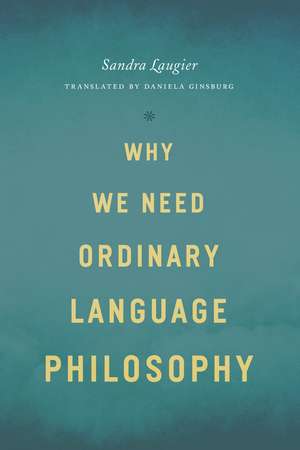Why We Need Ordinary Language Philosophy
Autor Sandra Laugier Traducere de Daniela Ginsburgen Limba Engleză Paperback – 15 noi 2023
Now in paperback, Sandra Laugier's reconsideration of analytic philosophy and ordinary language.
Sandra Laugier has long been a key liaison between American and European philosophical thought, responsible for bringing American philosophers such as Ralph Waldo Emerson, Henry David Thoreau, and Stanley Cavell to French readers—but until now her books have never been published in English. Why We Need Ordinary Language Philosophy rights that wrong with a topic perfect for English-language readers: the idea of analytic philosophy.
Sandra Laugier has long been a key liaison between American and European philosophical thought, responsible for bringing American philosophers such as Ralph Waldo Emerson, Henry David Thoreau, and Stanley Cavell to French readers—but until now her books have never been published in English. Why We Need Ordinary Language Philosophy rights that wrong with a topic perfect for English-language readers: the idea of analytic philosophy.
Focused on clarity and logical argument, analytic philosophy has dominated the discipline in the United States, Australia, and Britain over the past one hundred years, and it is often seen as a unified, coherent, and inevitable advancement. Laugier questions this assumption, rethinking the very grounds that drove analytic philosophy to develop and uncovering its inherent tensions and confusions. Drawing on J. L. Austin and the later works of Ludwig Wittgenstein, she argues for the solution provided by ordinary language philosophy—a philosophy that trusts and utilizes the everyday use of language and the clarity of meaning it provides—and in doing so offers a major contribution to the philosophy of language and twentieth- and twenty-first-century philosophy as a whole.
Preț: 182.98 lei
Nou
Puncte Express: 274
Preț estimativ în valută:
35.02€ • 38.06$ • 29.44£
35.02€ • 38.06$ • 29.44£
Carte disponibilă
Livrare economică 31 martie-14 aprilie
Livrare express 14-20 martie pentru 17.67 lei
Preluare comenzi: 021 569.72.76
Specificații
ISBN-13: 9780226829579
ISBN-10: 022682957X
Pagini: 168
Dimensiuni: 152 x 229 x 16 mm
Greutate: 0.2 kg
Editura: University of Chicago Press
Colecția University of Chicago Press
ISBN-10: 022682957X
Pagini: 168
Dimensiuni: 152 x 229 x 16 mm
Greutate: 0.2 kg
Editura: University of Chicago Press
Colecția University of Chicago Press
Notă biografică
Sandra Laugier is professor of philosophy at the University of Paris I Panthéon Sorbonne and a senior fellow of the Institut Universitaire de France. She is the author or editor of many books in French and several articles and chapters in English. Daniela Ginsburg is a freelance translator. She cotranslated Knowledge of Life by Georges Canguilhem.
Cuprins
Preface
Introduction
CHAPTER 1. From Empiricism to Realism
CHAPTER 2. Relativity, Conceptual Schemes, and Theories
CHAPTER 3. Truth, Language, and Immanence
CHAPTER 4. Language, Facts, and Experience
CHAPTER 5. Empiricism Again
CHAPTER 6. Language as Given: Words, Differences, Agreements
CHAPTER 7. The Ordinary as Heritage: Natural and Conventional
CHAPTER 8. The Myth of Inexpressiveness
CHAPTER 9. To Speak, To Say Nothing, To Mean to Say
Conclusion
Notes
Bibliography
Index
Introduction
CHAPTER 1. From Empiricism to Realism
CHAPTER 2. Relativity, Conceptual Schemes, and Theories
CHAPTER 3. Truth, Language, and Immanence
CHAPTER 4. Language, Facts, and Experience
CHAPTER 5. Empiricism Again
CHAPTER 6. Language as Given: Words, Differences, Agreements
CHAPTER 7. The Ordinary as Heritage: Natural and Conventional
CHAPTER 8. The Myth of Inexpressiveness
CHAPTER 9. To Speak, To Say Nothing, To Mean to Say
Conclusion
Notes
Bibliography
Index
Recenzii
“Sandra Laugier’s book is already quite influential in France and Italy, and it has drawn a renewed interest in language conceived not only as a cognitive capacity but also as used, and meant, as part of our form of life. This translation is very welcome, even indispensable, and could change the perspective on philosophy of language as well as on the analytic-continental divide.”
“Sandra Laugier’s brilliant book provides a concise history of the philosophy of language after Quine and Wittgenstein. But Laugier does more than that: she shows why Wittgenstein, Austin, and Cavell’s claim that to speak about language is to speak about the world is an antimetaphysical revolution in philosophy, a revolution that transforms our understanding of epistemology and ethics. Anyone who wishes to understand what ‘ordinary language philosophy’ means today should read this book.”
